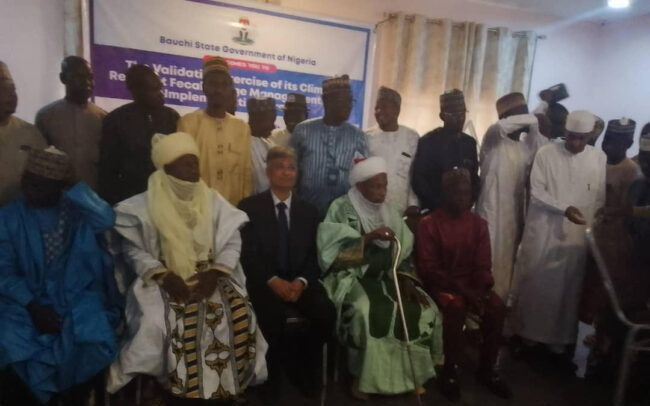United Nations Children Fund (UNICEF) has called on the Bauchi State Government to, as a matter of urgency, formally approve the implementation of the Faecal Sludge Management strategy for the good of the citizens.
The call was made by the Chief of Field, UNICEF Bauchi Field Office, Dr Tushar Rane, during a one-day valuation meeting of Faecal Sludge Management held on Friday in Bauchi.
Tushar Rane expressed readiness to enter into a partnership with the state government for effective faecal sludge management to promote a healthy environment, leading to the achievement of global objectives on safely managed sanitation and the Sustainable Development Goals related to water, sanitation, and hygiene (WASH).
He also said that the event was organised by the Bauchi State Environmental Protection Agency (BASEPA) in collaboration with the Bauchi State Rural Water Supply & Sanitation Agency (RUWASSA) with support from UNICEF and other Development partners.
He said that, “This validation exercise concludes the Faecal Sludge Management (FSM) review process that brought together key stakeholders in February this year to appraise the FSM strategy in line with the Bauchi state
Government’s commitment to ensuring a clean environment and the overall global concept of safely managed sanitation.”
The UNICEF CFO added that it will serve as the operational guidelines for all the service providers and relevant stakeholders within the faecal sludge management value chain: containment, emptying, transport, treatment, safe reuse or disposal in the state.
According to him, “It is important to highlight that Bauchi State is a leader in implementing WASH-related initiatives in Nigeria, particularly in faecal sludge management.”
He stated that, “Currently, Bauchi State has Nine Local Government Areas (LGAs) that have achieved LGA-wide Open Defecation Free (ODF) status. Two additional LGAs (Zaki and Jamaare) are close to reaching this milestone and will need support from the Bauchi State Government to do so by the end of 2024. ”
In his speech, the Bauchi State Commissioner for Housing and Environment, Rt Hon Danlami Ahmed Kawule, thanked UNICEF, WaterAid Nigeria, and other donor partners for the technical support they are providing to the state, which led to the state being among the leading states working towards actualising the Safely Management Sanitation goal.
The Commissioner, who was represented by Jerry M. Sanga, said that “the Ministry of Housing and Environment and BASEPA appreciate Governor Bala Mohammed’s tireless contributions, particularly in supporting all environmental projects and programs in the state.
He said that faecal sludge management, which starts with the storage, collection, transport, treatment, and safe end use or disposal of faecal sludge, constitutes the value chain of faecal sludge management.
According to the Commissioner, “I’m sure you will all agree with me that faecal sludge management has been very poor in most of our states.”
“But the story is now changing; in short, it is very awesome in Bauchi State due to the collective efforts of all the stakeholders that are present here,” he stressed.
The Commissioner added that “BASEPA, as a regulating agency under the Ministry of Environment, is doing good work by formalising all the key actors along the faecal sludge value chain in the state.”
He also stated that “the agency has come up with a guideline for the faecal sludge management and organises a series of capacity-building workshops for different actors in the FSM value chain across the state.”
He assured that the Ministry, as a policy formulation body, will continue to support BASEPA, RUWASSA, and all relevant stakeholders in order to achieve the successful implementation of the document in the state.
The Commissioner then appealed to all stakeholders to continue working within their communities, specifically to encourage neighbours, friends, and coworkers to understand the role they can play in protecting the environment and conservation of natural resources.
Also Speaking at the workshop, Sulaiman Ahmad Muhammad, the National WASH Consultant on FSM Implementation Strategy for Bauchi, said that the strategy document will guide Bauchi State stakeholders in the implementation of faecal sludge management across the service chain providers, and it is expected to be achieved within six years.
He said that the strategy document rests on eight pillars, which include stakeholder engagement, funding, capacity building, monitoring, and evaluation, adding that the implementation plan includes a timeline on how to achieve the activity between 2025 and 2030.
In his submission, the Acting General Manager of RUWASSA, Adamu Sabo, said that validation of the document is aimed at having in place a set strategy for faecal sludge management, stressing that lack of management of faecal sludge in the past has resulted in communicable diseases within communities.
“If there is no effective management of faecal sludge, there will be outbreaks of diseases such as cholera, diarrhoea, and thyroid, amongst others, but with this document in place, it will reduce the prevalence of diseases in the state, particularly in rural communities,” he said.
Also, READ THESE TOP STORIES FROM the Nigerian Tribe.
